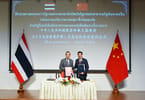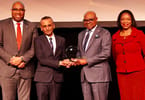The first T.20 Ministers’ Meeting was held in Johannesburg, South Africa, from February 22-24, 2010 to address tourism and its role in the global economies. Here, we present the opening address made by Marthinus van Schalkwyk, South African minister of tourism.
“I am honored to welcome you to this first T.20 meeting for tourism ministers from the world’s major economies.
“This meeting is a major step towards enhancing tourism’s central position as a driver of economic, social, and environmental development.
“Under the overarching theme of ‘Travel and tourism: stimulus for the global economy,’ the agenda for this meeting has been designed to respond to very real global challenges. The primary aim is to explore the synergies between strengthened global economic cooperation and the tourism sector’s efforts to build resilience and stimulate new sources of sustainable, responsible, and inclusive growth.
“In particular, I would like to welcome my ministerial colleagues and other senior officials from the T.20 countries. Thank you for joining us for this important first meeting of the group and for entrusting South Africa with hosting and chairing this inaugural meeting. Also, a special word of welcome to Mr. Taleb Rifai, secretary-general of the United Nations World Tourism Organization (UNWTO), who, from the outset, has been an ardent supporter of the T.20 member-driven initiative.
“I also express my appreciation to the other international guests and experts who have joined us for the meeting, including the New Partnership for Africa’s Development (NEPAD), the United Nations Environment Program (UNEP), the United Nations Economic and Social Commission for Asia and the Pacific (UNESCAP), the World Travel and Tourism Council (WTTC), the International Trade Centre (ITC), and the International Labor Organization (ILO). As intergovernmental organizations and experts with a direct interest in the role of travel and tourism in reviving the global economy, your contributions will be invaluable.
“Let us remind ourselves of the huge responsibility we have as tourism ministers from the world’s major economies. Tourism represents some 5 percent of T.20 countries’ gross domestic product, and together, we account for almost 70 percent of all international tourist arrivals and receipts generated in the world. We also recognize that tourism provides 75 million direct jobs globally, and contributes 30 percent of the world’s services exports, amounting to US$1 trillion a year. For those of us in the developing world, the sector represents 45 percent of our total services exports.
“Against this background, I was encouraged by the common resolve to deepen and broaden our cooperation expressed by tourism ministers when we met in Kazakhstan in October last year. Given the key importance of tourism in unlocking enhanced economic growth, infrastructure development, trade promotion, poverty eradication, and job creation, we agreed that tourism could, and indeed should, be further mainstreamed in global economic decision making. This meeting is a first step towards that objective.
“Let us for a moment take a step back, and ask why a coordinated response is required. We meet as the world starts to emerge from an unprecedented global economic recession, which impacted on all economic sectors, including tourism. Although the process of recovery is under way, it is still weak and uneven. Preventing unemployment and a jobless recovery remain the key challenges. Even though business and consumer confidence has picked up, economic growth in major source markets, especially in Europe and America, is still fragile.
“Observing business news headlines in the last months of 2008 was like watching an epic unfold – intense plots of unprecedented power and wealth turning into paralyzing loss, the collapse of established and trusted financial institutions, and shockwaves felt on stock markets across the globe. We witnessed fear, anger, shame, and intense panic not seen since the Great Depression of the 1930s.
“As the mirror of the world’s psyche in terms of consumer confidence, throughout 2009, the tourism sector directly reflected the fragile state of people across the globe. As news of the global economic crisis grew in volume and impact in every corner of the world, travelers started to cancel their business and leisure travel plans. Arrivals and receipts started to drop, and employment, development, and investment were soon to feel the strain.
“All of us gathered here today are painfully aware of the heavy toll this crisis took on our respective tourism industries and their underlying tourism economies. International tourist arrivals for business, leisure, and other purposes declined worldwide by some 4 percent to 880 million in 2009.
“The losses have been staggering. Revenues lost cannot be recovered. Flights canceled cannot be re-flown. Employment earnings lost cannot be repaid. Development frozen cannot be easily accelerated.
“Most importantly, fears seeded cannot simply be cast aside. People’s ‘what ifs’ soon became ‘what now’.
“However, through synchronized government interventions of unprecedented scale, facilitated by the G20, the world’s interconnected economies were pulled back from the brink of depression. By the end of the third quarter of 2009, we hit rock bottom, and thankfully, the only way out, was up. Recovery was said to be around the corner, and the re-energizing of our economies was under way. As confidence in this expectation grew, travel bookings started to recover. By year-end, traveler numbers and revenues were growing, and the red ink was turning black again.
“Reflecting the International Monetary Fund’s forecasts for the global economy this year, the UNWTO predicts growth in international tourist arrivals of between 3 percent and 4 percent in 2010.
“Despite the flexibility shown by the tourism sector in dealing with rapid shifts in demand and volatile market conditions, careful planning and vision are required to stay one step ahead of other economic sectors.
“Not one of us can afford to be complacent. The sun may not shine in the same way as in the past. Therefore, we have a responsibility to ask ourselves: what does it take to be a tourism leader in our brave new world? What do the new consumers and the new market look like?
“I have no doubt that honest reflection will reveal that the rules of the game have changed. Our sector will operate in a more cost-conscious environment, people will retire later, and tourists with less discretionary spending will take trips closer to home and will stay for shorter periods. Globally, money to finance construction for public and private tourism infrastructure will remain tight. Oil prices and travel costs will remain unpredictable, as will peace and security. A jobless recovery could remain a real threat.
“I, therefore, believe that, in the context of the enhanced and much-needed international cooperation that emerged from the global economic crisis, inter alia in the G20, tourism ministers are today presented with an opportunity to speak and act in a much improved and coordinated manner on a number of global issues.
“As the global economic outlook moves from recession to green shoots to exit strategies, we must ask how tourism can help to rebuild the global economy, adapt existing tourism models to new challenges, accommodate both economic and ecological imperatives, and balance competitiveness and unworthy competition. We must ask how, together, we can build a sustainable and resilient sector.
“It is about more than recovery – it is about transformation. We cannot return to pre-crisis business-as-usual; we must work smarter, be flexible, and work towards economy-wide convergence of a travel and tourism industry that too often still operates in silos. We need to speak as one and be seen to speak as one.
“In South Africa, the risk management approach of balancing domestic, regional, and international tourism, as well as traditional and emerging source markets, is bearing fruit in these tough times. Likewise, there is a political determination to respond to the latest economic trends; to be flexible in decision making; adjust to changing circumstances; seek new opportunities; and stay focused on the long-term objectives of sustainable economic development, human development, and the creation of decent jobs.
“We will be learning from each other’s experiences over the next two days. Allow me to outline five opportunities and challenges that I believe we face as tourism ministers in this T.20 group.
“Firstly, we need to strengthen the analytical base that underpins the economic and development case for travel and tourism. We need to improve the way we articulate and communicate tourism’s ability to create jobs and address poverty.
“Secondly, we need to intensify our collaboration to mainstream tourism on the global agenda – securing a rightful place for our sector with the ultimate aim of expanding the reach of the economic benefits of tourism to a larger segment of the world population.
“Thirdly, we must continue to examine those international economic frameworks that have a significant impact on global tourism development, and in the process, mobilize a collective effort to respond in a coordinated way.
“Fourthly, we must find new ways to facilitate easy movement of tourists between countries, addressing unnecessary travel barriers and fostering mutual understanding and cooperation.
“Finally, we should actively support the evolving programs of the international community, including the G2O, UNWTO, international and intergovernmental bodies such as the ILO, and private sector organizations such as the WTTC and the International Air Transport Association (IATA), to stimulate the global economy, enhance employment, alleviate poverty, and transform progressively into a green economy.
“With these words I welcome you, and invite you to join me in a constructive dialogue.”
WHAT TO TAKE AWAY FROM THIS ARTICLE:
- “I also express my appreciation to the other international guests and experts who have joined us for the meeting, including the New Partnership for Africa's Development (NEPAD), the United Nations Environment Program (UNEP), the United Nations Economic and Social Commission for Asia and the Pacific (UNESCAP), the World Travel and Tourism Council (WTTC), the International Trade Centre (ITC), and the International Labor Organization (ILO).
- “Observing business news headlines in the last months of 2008 was like watching an epic unfold – intense plots of unprecedented power and wealth turning into paralyzing loss, the collapse of established and trusted financial institutions, and shockwaves felt on stock markets across the globe.
- The primary aim is to explore the synergies between strengthened global economic cooperation and the tourism sector's efforts to build resilience and stimulate new sources of sustainable, responsible, and inclusive growth.






















